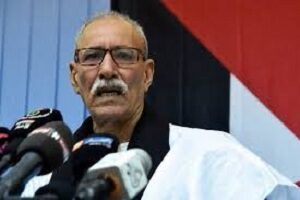
Western Sahara President Brahim Ghali has urged the African Union, the United Nations and Morocco to fast-track the long delayed referendum on the self-determination of the Arab nation.
Until then, he said, the continent will not realise freedom.
Addressing delegates on the second day of the SADC Solidarity Conference in Pretoria, Ghali said the conference was a message to demand the attainment of justice.
Attending the conference were various SADC Presidents, Deputy Presidents and Ministers. There was also a strong attendance of liberation struggle party representatives from Africa, Cuba, Venezuela, and Nicaragua and from other parts of the world. Among the delegates were representatives of South Africa’s liberation parties and labour unions the ANC, SACP and Cosatu.
“Through the support of the Western Sahrawi state, which reflects the will of the people and thus supports their struggle for resistance until they are fully able to exercise their legitimate and alienable to self-determination and a completion of their sovereignty,” said Ghali Tuesday.
The resolution and charter of the African Union and United Nations call for the eradication of the world’s last instances of colonialism.
“This conference is a reminder of landmark decisions such as the international court of justice (in 1975) which denies the Moroccan sovereignty over Western Sahara… The countries are two distinct states. The court’s decision forbids the exploitation of the Western Sahrawi natural resources without the consent of [its] people,” he said.
The conference, he added, was an “explicit” message to Morocco and the European Union to stop the illegal plundering and exploitation of the country’s natural resources.
The Sahrawi choices and aspirations are clear and firm in the attainment of freedom, he said.
“In 1991 the Sahrawi Republic was celebrating its 15 anniversary and the tenth year as a member of the Organisation of the African Unity, nevertheless the Sahrawi responded to the international appeals and decided to engage in the OAU settlement plan with a view to organise a referendum for the self-determination of the Sahrawi people which the Kingdom of Morocco kept obstructing for 27 years,” Ghali said.
He said the conference was an urgent appeal to the United Nations, the African Union and Morocco to expedite the organisation of the much stalled referendum as it is the democratic and only solution that is endorsed by the international community and agreed to by the two parties.
“The historical letter that was written by former President Thabo Mbeki to the Kingdom of Morocco … that its refusal to have the referendum is an affirmation of the relevance to recognise Western Sahara as a state,” he said.
Two years ago, when Morocco was readmitted to the AU, the country was urged to urgently adhere to the call for the referendum. He said Western Sahara was ready to enter in negotiation with Morocco in good faith and without any preconditions to resolve the conflict between neighbouring countries.
South African President Cyril Ramaphosa said the people of Western Sahara have been deprived of the most fundamental right of self-determining their own destiny.
“We are here to hear from the Sahrawi Arab Democratic Republic and [discuss] what we can do in them advancing their cause. While we are here to express our unwavering solidarity for the just cause of our brother and sisters, any action going forward must be decided upon by the Sahrawi people,” he said.
The President said it was fitting that the conference was held at the OR Tambo Building, which was named after South African liberation icon Oliver Reginald Tambo, who supported the self-determination of the Western Sahara.
He said South Africa will continue to encourage all parties to engage in fruitful discussions in an effort to bring an end to the deprivation of the Western Sahara people and their displacement.
“Let us support efforts by the UN to bring Morocco and Western Sahara back to the discussion table,” he said.
SADC chairperson and Namibia President Hage Geingob said although numerous African countries had attained freedom, the Arabian state remained a subject of oppression and colonial occupation.
“We are here to reaffirm our solidarity with the people of Western Sahara as they struggle in their legal right for self-determination. We have explicitly outlined our visions aspirations. These will not be achieved in the absence of freedom of all of Africa.
The prolonged impasse will have grave consequences on the functioning. We can only move forward if freedom is guaranteed on all our citizens. Freedom is not a gift to the people of Western Sahara, it is a right. Freedom is their birth right,” he said.
He said he was aware of attempts to divide the continent on this matter, adding that it was important to question if the SADC region was united in the quest to liberate the troubled country. This was as some member states were reportedly in Morocco for a parallel conference on Western.